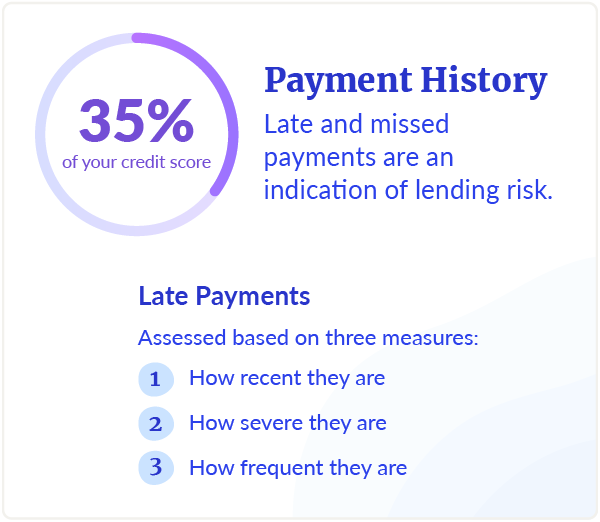Your payment history is the biggest factor that impacts your credit score, as it makes up 35% of your score. Missing one bill payment can decrease your credit score by as much as 150 points, according to Borrowell internal data. A single late payment could prevent you from qualifying for prime credit cards, low-interest loans, and attractive mortgage rates.
Lenders look at your credit score when qualifying you for products. Late payments will impact your credit score and raise red flags to lenders. In order to keep your credit score healthy and maintain your financial reputation, it’s important that you stay on top of your bill payments.
There are other factors that impact your credit score, including your credit utilization and the number of hard credit checks made on your credit report. That said, paying bills on time is crucial for keeping your credit score healthy.

How much does my credit score drop if I miss a payment?
How much a late payment impacts your credit score depends on several factors, including:
How large the late payment was
How long the payment was overdue
How recent the late payment was
How often you’ve made late payments
There’s no exact answer to how much your credit score could drop by, as Equifax and Transunion use different scoring models to calculate your score. If you have a good credit score of 713 or above, a 30-day overdue payment could cause your credit score to drop by 90-110 points. If you wait another 30 days before making that payment, your score may drop even further.
Not sure what your credit score is?
You can check your credit score for free by signing up for Borrowell. Find out if a late payment is negatively impacting your credit score.
The key takeaway is that the longer a bill goes unpaid, the more potential damage it can have on your credit score. Here’s how your credit score and credit report are impacted based on how long your late payment goes unpaid for.
If your payment is less than 30 days late
If your payment is less than 30 days past-due, you won’t see a hit on your credit score. You might be charged a late fee by your lender or see your interest rate increase if you miss your bill, but your credit score won’t be impacted.
If your payment is more than 30 days late
If you miss a payment by more than 30 days, your creditor will report this to the credit bureaus. When this happens, a note about your late payment is added to your credit report. This impacts your credit score and can remain on your report for up to six years.
If your payment is more than 120 days late
If your payment is at least 120 days past-due, your lender may label your account as a charge-off. A charge-off is considered a derogatory entry on your credit report, which is an extremely negative label. This can severely impact your credit score and your ability to borrow funds or apply for credit in the future.
If you make multiple late payments
If paying late becomes a habit, your account could also be charged-off or sent to collections. This could further harm your credit score and make it difficult to access different types of credit.
What is a charge-off?
A charge-off means a lender has written off your account as a loss, and the account is closed, meaning you’ll no longer be able to use it. Your lender will likely first contact you to remind you of your past-due amount before your account is charged-off.
If this happens, your debt is transferred to either the company’s internal collection agency or a third-party collection agency. You’re still responsible for paying this overdue balance, however. The agency will aggressively pursue you until your debt is paid, whether it’s a credit card balance, a personal loan, a student loan, or other debt.
A charge-off is a derogatory entry that will stay on your credit report for up to 6 years from the date of your first missed payment on the account. If you pay the charged-off account before the 6-year period is up, it will remain on your credit report but may have a less severe impact on your credit score.
Are there any other negative effects that come with a late payment?
Apart from impacts to your credit score, there are other negative effects you may experience if you make a late payment. These impacts include:
Late penalty fees
Interest rate hikes
Decreased financial reputation
Late penalty fees
If your loan payment or phone bill is overdue, your lender or service provider may charge you a late fee. Your late fees usually show up on your next scheduled bill. If you continue to make late payments, you may be charged additional fees or more severe penalties. Keep track of your bill due dates to avoid these annoying late fees!
Interest rate hikes
If you regularly make overdue credit card payments, your provider may bump up your interest rate as a penalty. If you originally had a promotional rate with your credit card, your provider might strip that away as a consequence of your late payments. Depending on your provider, these penalties may be temporary or permanent.
Decrease financial reputation
Alongside late fees, interest rate hikes, and a credit score drop, your financial reputation with lenders may become more volatile. Lenders want to work with individuals who have demonstrated a strong history of making payments on time. If you pick up a bad habit of consistently making 30-day late payments, this will be reflected on your credit report. Lenders will be more hesitant to work with you, and your credit card, loan, and mortgage options will begin to shrink before your eyes.
When does a late payment show up on credit reports?
All of your payments to lenders and creditors are recorded on your credit report. Late payments are categorized as either 30, 60, 90, or 120 days late. Charged off accounts are also listed on your credit report.
Lenders use standard codes when reporting your payments to credit bureaus. Each payment on your credit report includes a rating between 1 and 9 that indicates when you made the payment.
Here’s how payments with ratings between 1 and 9 show up on your credit report.
1 - Paid in full as agreed, within 30 days of billing
2 - Late payment; 31-59 days late
3 - Late payment; 60-89 days late
4 - Late payment; 90-119 days late
5 - Late payment; more than 120 days late, but not yet rated“9”
6 - This code is not used
7 - Regular payments under a consolidation order, Orderly Payment of Debts, consumer proposal, or Debt Management Program with a credit counselling agency
8 - Repossession of property
9 - Charged-off account written sent to a collection agency, or bankruptcy
Having payments on your credit report with a rating of 1 will help you achieve and maintain a strong credit score. Payments on your credit report with ratings higher than 1 will hurt your credit score. The higher the rating, the larger the impact on your credit score.
How long do late payments stay on your credit report?
In Canada, late payments stay on your credit report for up to 6 years from the date reported. This late payment remains on your credit report even if you’ve paid the past-due balance in full. If a late payment was reported in January 2018, it will come off your credit report in January 2024, which is 6 years after the missed payment was reported. The exception to this rule is for individuals in Prince Edward Island: late payments on secured loans can remain on your credit report for 7-10 years.
Collections, bankruptcies, and other information can remain on your credit report for longer, so it’s important to regularly check and monitor your credit report to review this information.
Wondering if a late payment is on your credit report?
You can download your Equifax credit report for free by signing up for Borrowell. Download and print your credit report to see if any lenders or creditors have reported a missed or late payment.
Can late payments be removed from your credit report?
There are ways to request for a late payment to be removed from your credit report, but it can be difficult. You should start by printing your credit report and reviewing the payments that have been recorded on accounts in your report. If you find a late payment associated with an account, review it carefully. Incorrect or old payments can be disputed and much easier to remove than accurate late payments.
Removing incorrect or old late payments on your credit report
If you find a late payment that you believe you paid on time, verify the statements from the account where the bill came from. Check that the account isn’t showing a late payment and that you received a payment confirmation.
If you find a late payment on your credit report that’s over 6 years old, it likely shouldn’t be there anymore. It could be a mistake, and you may have a valid reason to dispute it.
Whether you find an incorrect or an old late payment, you can dispute the information on your report with the credit bureau (either Equifax or TransUnion). If there is an inaccurate late payment, charge off or other judgements, get your report, identify the error, and request the credit bureau remove it immediately. This could happen if you have taken a payment deferral and it has been improperly reported to Equifax.
Removing accurate payments on your credit report
If the information on your report is accurate, it’s going to be a challenge to get a late payment removed. Depending on the creditor, it may be possible to negotiate and remove negative late payment information in exchange for full or partial payment of your debt. It may require writing a goodwill letter explaining your situation or negotiating a payment plan. Creditors are required to report accurate information to credit bureaus, so this isn’t a guaranteed solution.
If you’ve made a 30-day overdue payment and noticed that it isn’t yet on your credit report, contact your creditor as soon as possible. You may be able to discourage your creditor from reporting the late payment to the credit bureaus before it goes any further. This method is especially promising if it’s the first time you’ve missed a payment with your creditor.
Removing late fees and other penalties from creditors
You can also contact your creditor to request removing any late fees or interest rate hikes that have occurred from a late payment. If you’re in good standing with your bank, you could try asking them to forgive or remove the late fee on a loan payment you missed. If a late payment caused your credit card rate to rise, your credit card provider will typically reset your interest rate back to regular levels if you make six consecutive months of on-time payments.
The Bottom Line
Late payments can have a long-lasting impact on your credit score. It can take 18 months for your credit score to fully recover from late payments on your credit report. Because of this, you should build good habits to make all your bill payments on time. This can help you avoid hits to your credit score, along with late fees and interest rate hikes from lenders and creditors.
Try setting up automatic payments when possible, or use a free bill tracking tool to manage and review your upcoming bill payments. If you’re struggling to keep up with payments, or if a sudden emergency has sideswiped your finances, don’t be afraid to reach out to creditors. Find out if they offer deferments, or payment deferral plans so you can avoid negative hits to your credit score.
You can use Borrowell to regularly check your credit score for free. Checking your score with Borrowell won't impact your score, so you can keep regular tabs on whether any late payments have been hurting your score.






